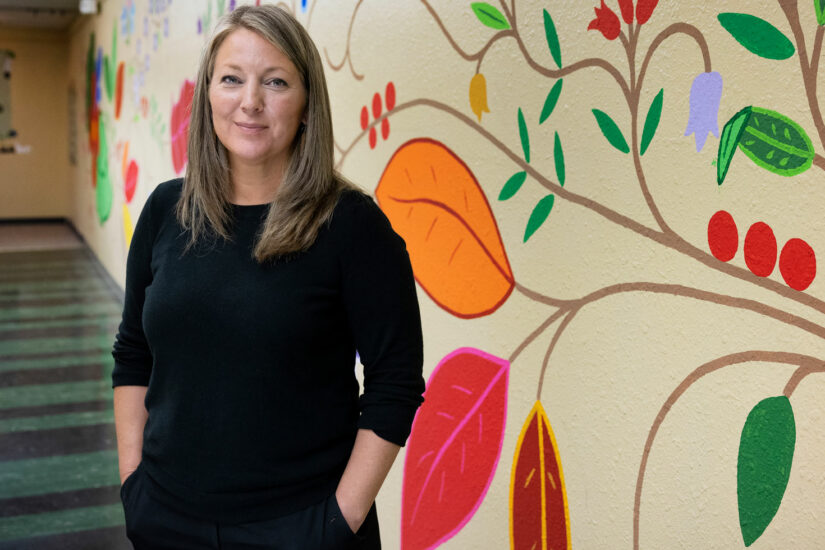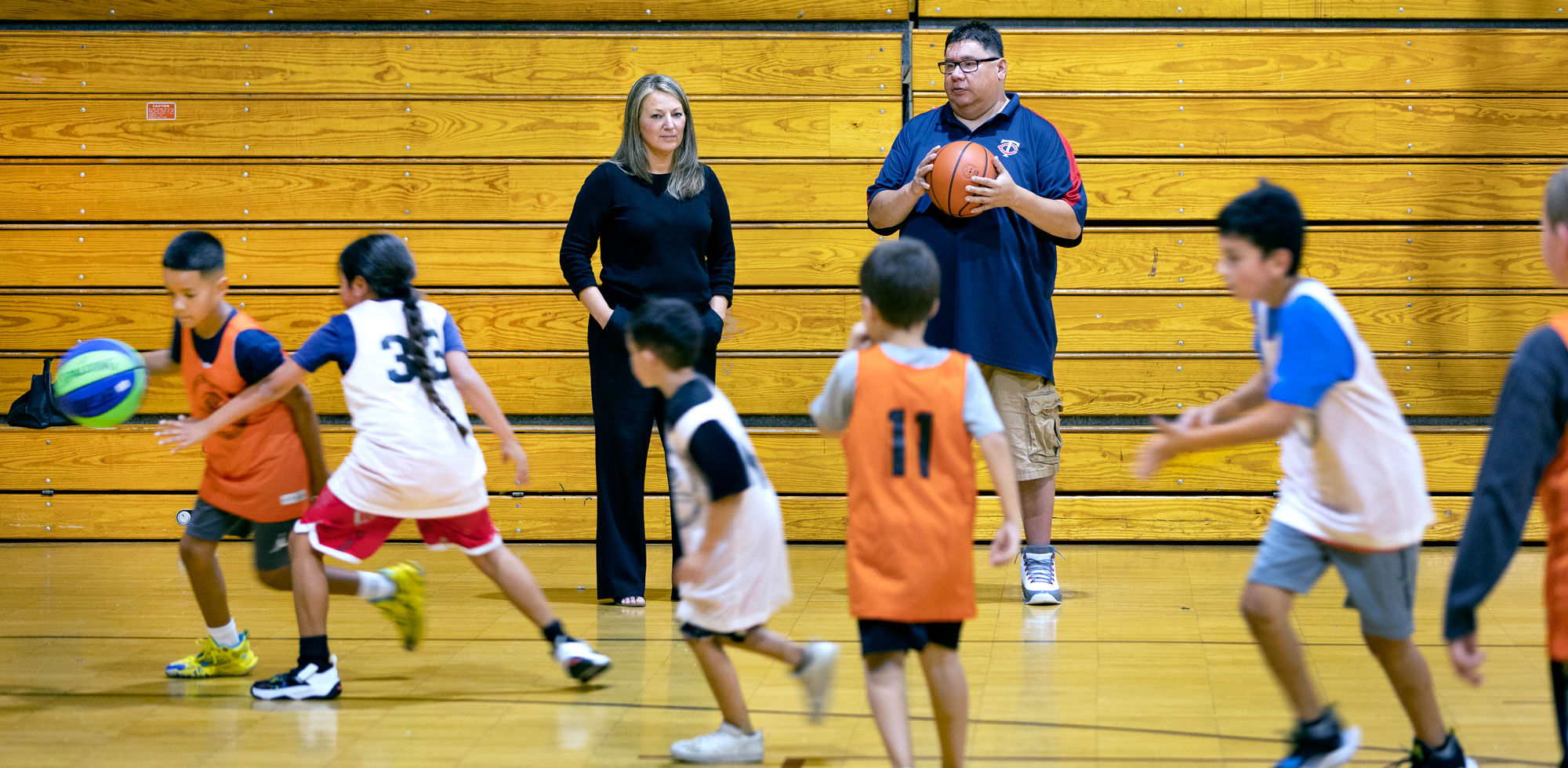
A Gift of Gratitude
Palmer sees $10,000 donation as part thank-you, part investment in the region
By Gene Rebeck | Photography by Paul Middlestaedt
Tuleah Palmer began her impressive career path in nonprofit management in 1999, when she became the Initiative Foundation’s first Volunteers in Service to America (VISTA) candidate to be placed in the region.
More than two decades later, and several years into her most recent role as president and CEO of the Blandin Foundation based in Grand Rapids, Palmer has committed to a personal $10,000 gift to the Initiative Foundation’s general endowment. The gesture is part thank-you and part investment in the future of the region.
Born in Deer River just northwest of Grand Rapids, Palmer grew up in northern Minnesota and has lived in Cass Lake for 18 years. She was 20 years old and a new mother when she entered the AmeriCorps VISTA program. “She shared that we were the first institution that trusted and invested in her, and that she’s never forgotten that,” said Don Hickman, interim co-president and vice president for community and workforce development at the Initiative Foundation.
AmeriCorps is the federal agency for national service and volunteerism. It provides opportunities for Americans to serve their country domestically, to address the nation’s most pressing challenges, improve lives and communities, and to strengthen civic engagement. Each year, the agency places more than 200,000 AmeriCorps members in community-based service roles.

Palmer’s VISTA placement was at the Boys & Girls Club of the Leech Lake Area, which had opened in 1999, just a few months prior to her service term. The Initiative Foundation provided most of the club’s start-up funding. The placement was close to Palmer’s Cass Lake home, and it was close to her heart. She received AmeriCorps training on planning, grant-seeking and grants management, and she developed skills in program design and evaluation, marketing, outreach, and engagement.
“I loved that service year,” Palmer said. “I learned so much about how community work moves through small communities. I learned how to look for changes in norms and about creating and protecting opportunities for people to influence their community. No one really wants something ‘done’ to them. Good organization and good capacity-building work needs to be backed by community voices with the muscle behind it from the start, and Cass Lake was all about that.”
Palmer’s service helped her earn a professional fundraising degree at Clemson University. She also holds a bachelor’s in applied psychology from Bemidji State University. She has since built a record of achievement in leadership positions—from Tribal units in the Leech Lake/Cass County region—and has helped organizations earn recognition and significant funding. Her path to the Blandin Foundation included roles as executive director of the Boys and Girls Club of the Leech Lake Area, where she got her VISTA start, as a community development planner for the Leech Lake band of Ojibwe, and as executive director of the Northwest Indian Community Development Center in Bemidji.
“I’ve worked to share what I learned serving Cass Lake,” Palmer said of her career arc. “In all the roles I’ve held since, I focused and rebalanced resources, relationships, and approaches to transform work in community and economic development, workforce development, and systems change.”
As she guides and reimagines Blandin’s programs and grantmaking, Palmer is putting her deep knowledge to work in new ways. She knows rural residents often serve many roles, including parent, community volunteer, and elected official. The unique demands of rural living change how programs are launched and how they evolve. From her experience as a VISTA volunteer in Cass Lake, “I learned a lot about the generosity of community that I didn’t learn in college,” Palmer said.
An Investment in Community
This year, Palmer has made a different and more personal kind of impact. She has donated $10,000 to the Initiative Foundation’s general endowment—$7,000 in 2023 and a pledge to give $3,000 in 2024. “I wanted to give back,” she said. “I was 20 years old with a baby, and they invested in me. If it wasn’t for the Initiative Foundation, I really doubt that I’d be in this position.”
Why are donors like Palmer choosing to give to the Initiative Foundation’s general endowment?
“Folks know that by giving to the Initiative Foundation’s general fund, they’re not just powering this one organization,” said Carl Newbanks, director of development for the Initiative Foundation. “They really are giving voice to those rural leaders who say, ‘We have this need. We have this solution. We need an infusion of resources to help us get to the next step.’
“Donors who make a gift to the Initiative Foundation understand that it’s not so much about the gift they’re making today but rather that they are part of something bigger that will continue to build and provide resources for the region forever,” Newbanks said. “The combination of many people giving in small or large amounts continues to build the fund, which continues to spin off greater resources to meet the needs of the region.”
A Place in Her Heart
Investing in local people and their potential is close to Palmer’s heart. As she gains traction in her new role, Palmer and her Blandin Foundation team are resetting the organization’s strategy to focus its grantmaking on community wealth-building and rural placemaking. The organization also is stepping up its investments in regional residents via leadership and scholarship development.
Palmer’s 25 years of grants management experience has provided her with a deep understanding of how nonprofits and communities need to collaborate. “If we want change to happen, we have to be a part of that change,” she said. Palmer hopes her donation demonstrates that rural people can raise money for rural communities and not be solely reliant on outside funds.
“The Initiative Foundation is one of the only foundations in the region,” Palmer said, “so the demands on them far exceed the resources they have to meet the need.”
In making her donations, Palmer believes she is modeling the way. “Rural people make a difference,” she said. “And we need more resources in rural places that can help them make the changes that are needed. To me, the general endowment is really important.” While donors can, of course, direct their contributions to a specific cause or program, Palmer said, “I wanted to not do that. I just wanted to say, ‘Thank you for what youve done—for me, for our community, and our region.’”